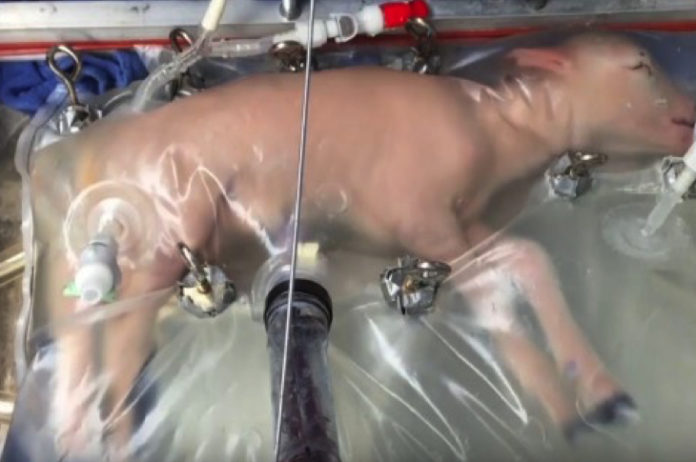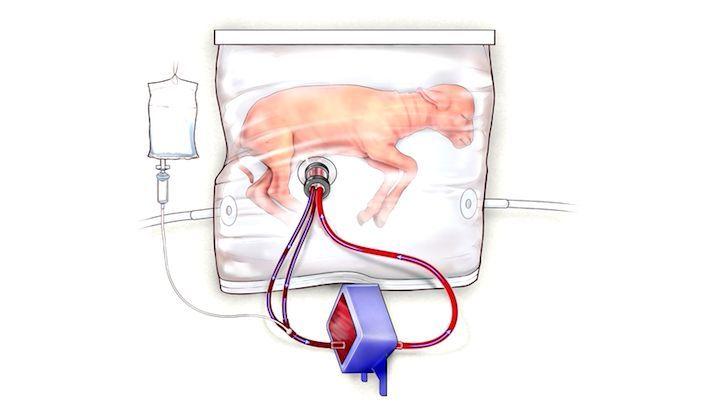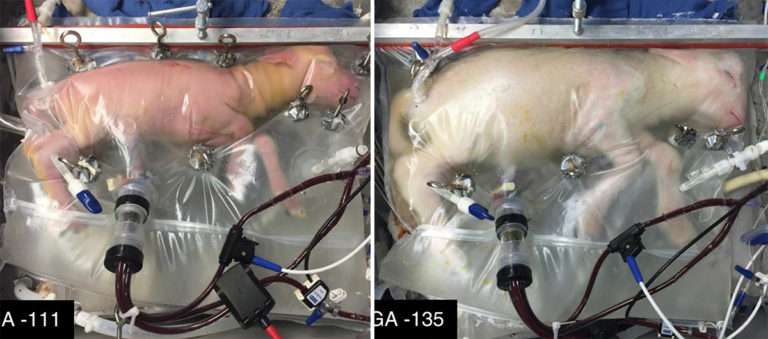
By at trueactivist.com
Eight premature lamb fetuses were kept alive and grew substantially in the ‘artificial womb’ for four weeks.
When babies are born prematurely, they can incur all sorts of health problems depending on how early they are born, and many of these issues can either cause their death within their first few years of life or lead to a painful existence marked by hospital visits and medication. According to the World Health Organization, 15 million babies are born prematurely in the world every year, and it’s the leading cause of death amongst children under five. About one million premature human babies die annually, but this could all change with a new development by researchers.
Scientists with the Children’s Hospital of Pennsylvania have developed an ‘artificial womb‘ that replicates the activities of the uterus and placenta and has already worked with great success in growing a lamb fetus into a baby. In the tests, scientists were able to keep eight extremely premature lamb fetuses alive for four weeks in their ‘womb‘ and observed that their lungs and brains grew, sprouted wool, opened their eyes, wriggled around, learned to swallow, and had what appeared to be normal organ functioning after close examination.
“We’ve developed a system that, as closely as possible, reproduces the environment of the womb and replace the function of the placenta,” lead author Dr. Alan Flake told New Scientist. “It’s complete science fiction to think that you can take an embryo and get it through the early developmental process and put it on our machine without the mother being the critical element there.”

t’s called the Biobag and its success can be pinned on the fact that it’s a sealed environment that is filled with water and salts to mimic the nutrients usually supplied by a uterus. It uses a pumpless system to continuously circulate the fluids and an oxygenator attached to their umbilical cord utilizes their own heartbeats to deliver oxygen.
Thanks to scientific advancements, many babies that are born between 22 and 24 weeks have been able to survive, but only after spending months in incubators in the neonatal intensive care unit, with the guarantee that they will have chronic health issues if they are amongst the 30 to 50 percent that live. The goal for the doctors in this study is to place babies born at 24 weeks and nurse them in the Biobag until they are 28 weeks, which is a much more viable age.
“Our intention would not be to support them on our system until they are a chubby 40-week gestation babe,” Dr. Partridge, one of the researchers at the Children’s Hospital, said in a video released with the study. “The idea is to bridge the rough patch when they’re really struggling and carry them through to a point where they can do OK.”
For humans, doctors would need to deliver the premature baby via Cesarean section and the fetus would be given a dose of narcotic. They would connect the system’s circuit to the umbilical cord through a vein and, once blood is flowing properly, the cord would be detached from the mother.
Flake and his team are currently speaking with the U.S. Food and Drug Administration to work on turning this Biobag into a viable solution for premature human babies, but scientists say that it would take years for it to get on the market, assuming it’s even accepted.
“We’re in the process of interacting with the FDA, so it’s not impossible that we could be doing a clinical trial one to two years from now,” Flake said.
Some scientists think that the Biobag, though effective, could lead to some ethical issues that interfere with the workplace and abortion policies. They worry that bosses will ask mothers to use the Biobag to avoid long maternity leave or that babies will be unnecessarily subjected to a stressful situation in which they are not guaranteed to survive.
The team knows they have some issues to work on; the bag would need to be three times smaller to fit the humans instead of lambs, the amniotic fluid isn’t perfected and the system doesn’t work for babies delivered vaginally. However, the doctors are confident that they will be able to address all these issues going forward and are excited for the future.






Humans are messed up in the head.